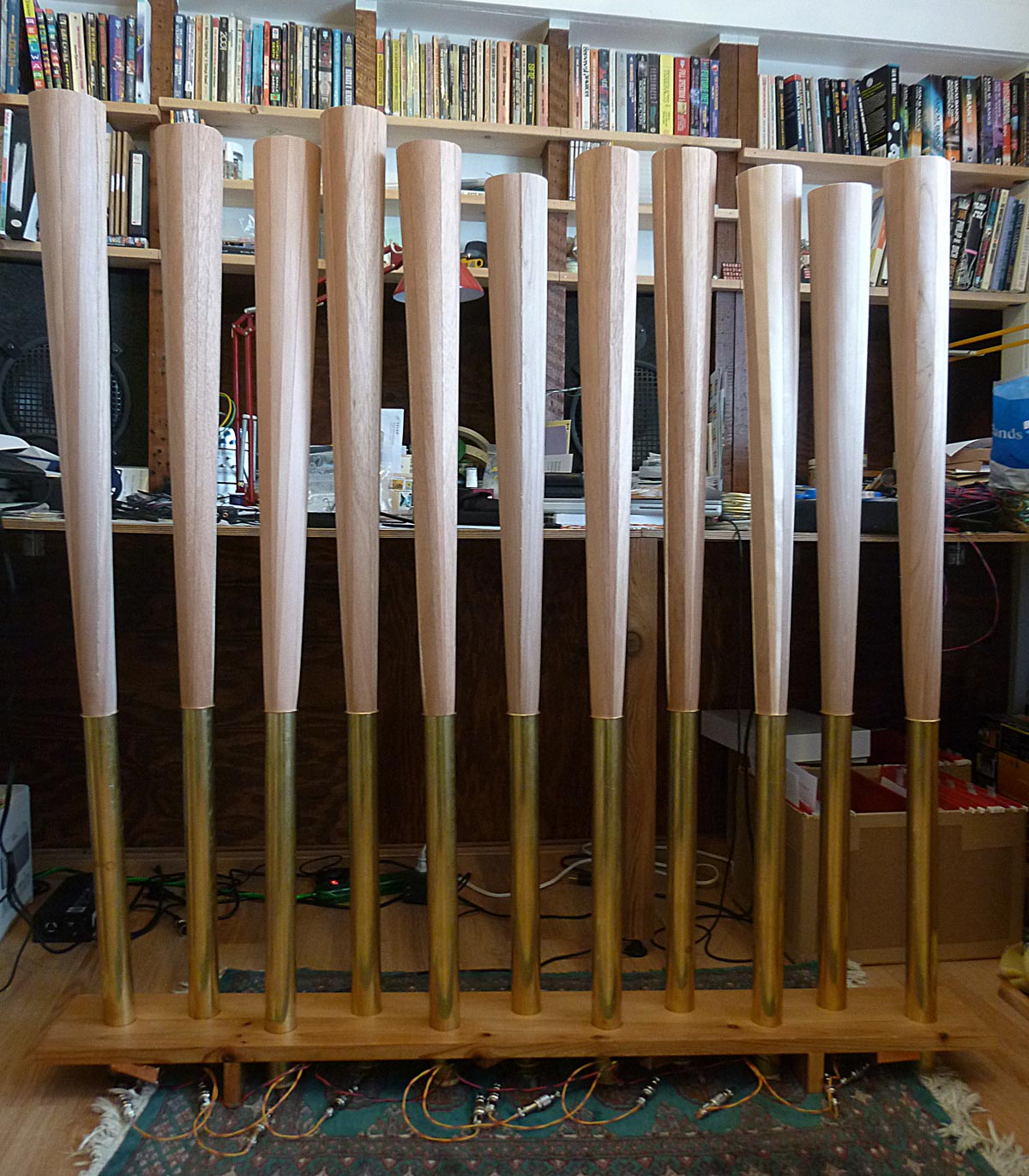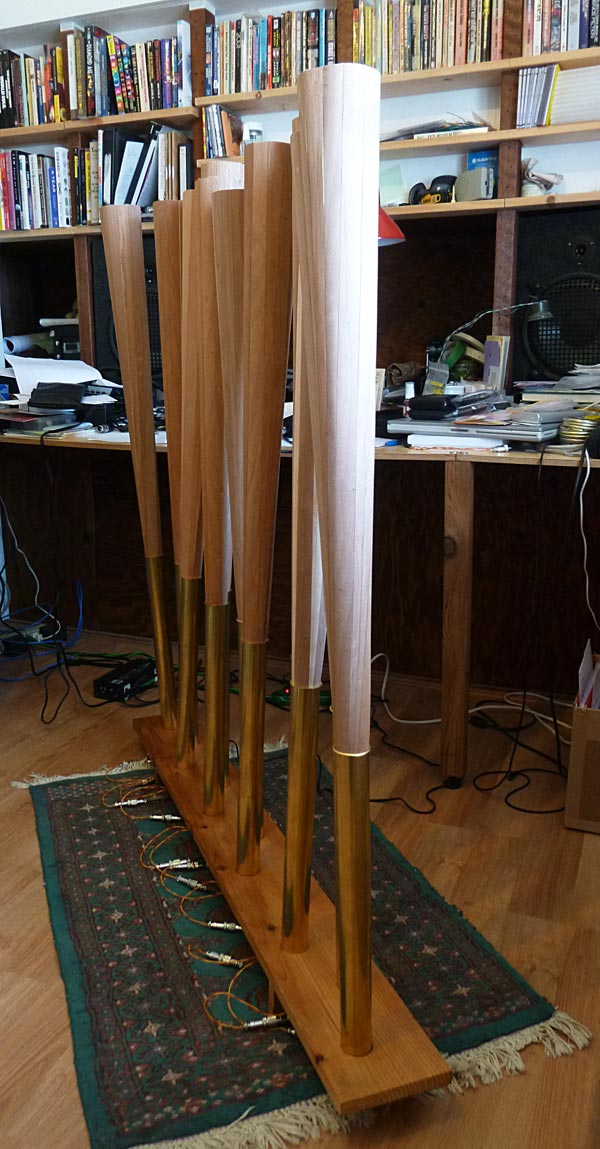
| ||

| ||
| < 2013 .. rain stick | H O M E | magnetic south .. 2013 > |
|
Possession
Possession is an audio installation that uses eleven hand-built directional speaker trumpets. Each speaker is approximately 4 feet long. The speakers stand upright in a row. Each speaker plays a soundtrack of background sounds and voices. From a distance the listener hears a cacophony of mumbling. Up close, the listener can move his/her ear in-line with a speaker, and then the voices will come clear. The piece is fascinating and at the same time disorientating (challenging the listener to figure out what the heck is going on). It has a strong sense of intimacy in the way that the individual speakers draw the ear into a very small and focused space. At the same time, from a distance, the piece feels very chaotic - made up of many voices that are cast adrift, not necessarily relating to each other in any obvious way. The piece uses fragments of text from four novels: "Bone Dance" (1991) by Emma Bull, "HAP" (1992) by Peter Courtemanche, "Humanoid" (2009) by Miguel Burr, and "Transition" (2009) by Iain Banks. The fragments of text describe different characters' reactions to fighting or returning from a state of possession. The fragments from "HAP" describe the mental state and observations of a political and economic outcast whose state of mind is not always under his control.
The sound of Possession - recorded June 14, 2013.
You can listen to a short mix of some of the sounds from the piece. I recorded this by moving a microphone over the ends of the speaker trumpets: moving from possession to poverty and back again. This will give you a sense of what the piece is about, but it is quite different experiencing the 11 channels simultaneously and moving your ear about relative to the speaker trumpets.
Speakers in the studio - June 2013.
This piece is inspired by the science-fiction novel "Bone Dance" by American author Emma Bull. Emma Bull is an unusual author in the science-fiction genre as she is often more concerned with identity and the individual human condition then she is with the larger technological or sociological phenomenon that form the backdrops of her stories. In the case of Bone Dance, she uses possession as a metaphor to explore the power play between an individual, her community, and the state. The novel takes place in a post-apocalyptic Minnesota. The military-industrial world has triumphed and at the same time self-destructed, leaving a world where the social and political attitudes/ideologies of the past are known and followed, but no longer trusted. Within this environment a chaotic scenario unfolds involving the Horsemen (creatures capable of possessing the minds and bodies of others), the city state (which is trying to maintain control of the populace through regulations and restricting the flow of energy), and the Hoodoo Engineers (who are the architects of a new more self-sufficient and sharing society, loosely based on ideas from Louisiana Voodoo).
Speakers in the studio - June 2013.
Multi-channel Micro-speaker Mayhem The 4 foot long speaker trumpets are modelled on an exaggerated version of a spirit trumpet (often fashioned from paper or card) as seen in photographs of seances and other events involving the "channelling" of spirits in the mid to late 1800s and early 1900s through the 1930s/40s. They are also reminiscent of old automobile horns and parts of speaking-tube systems, only they are much longer. Possession plays with the idea of exaggeration: where pretend crosses the line with reality; where belief explains stagecraft as part of an otherworldly influence; and where fear leaves someone "out in the cold" on their own. The piece tries to connect the process of spirit possession with the processes of poverty (or societal/economic) oppression. This oppression could take many forms. It could be a lack of support for people who need help (including people who are unable to look after themselves). It could be political systems and/or legislation that make life unaffordable or more difficult to manage (for those who could look after themselves, but then can't anymore). It could be as simple as their cost of living suddenly becoming higher than their income. It could be the closure of places where they used to go for help. I'm not sure if the piece succeeds in drawing parallels or not. Certainly the idea of spirit possession is much more dramatic than the reality of poverty (although poverty is often extremely dramatic to the person/people experiencing it). The sound - when heard by placing your ear close to the array of 11 speaker trumpets - is definitely fascinating and perhaps mesmerizing, but figuring out what it might mean is difficult. At the same time, the chaos and uncertainty embodied in the sound is a reflection on the states of mind that the piece is talking about. The thing I like about micro-speaker trumpets is their Intimacy: the way that people naturally put their ear up to the opening and fall into a world of sound that belongs to them alone. This is also true of other types (shapes) of micro-speaker but the trumpet has a certain feel to it. It is connected to the shapes of pre-electronic sound transmission technologies (speaking tubes, megaphone cones, etc.) and also early sound systems that were intended for small spaces (such as the trumpet flare speakers on phonographs).
|
|
absolutevalueofnoise.ca | audio available on bandcamp |


